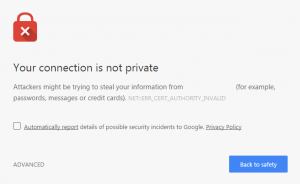If you’re an estate agency that values their website, or a WordPress developer that works on property websites, this post is for you. Especially if you don’t already have an SSL certificate on your website. We’ll be looking at why you should have an SSL certificate and the advantages that come with it.
You might be under the impression that SSL certificates are only needed for e-commerce websites or sites that have some sort of user login area. You might think adding an SSL certificate doesn’t apply to you and that you won’t benefit from it, but it can have a significant impact, even for the most basic of sites.
Before we delve any further let’s look at what we’re referring to here when we talk about SSL certificates. This is easily demonstrated on this page you’re currently viewing. If you look at the website address you’ll notice it begins with ‘https://’ as opposed to ‘http://’. This tells us a certificate is installed and that any data sent back and forth is encrypted ensuring it’s kept private.
Note that just because a web address begins with ‘https’ doesn’t automatically mean it has a valid certificate installed. If that’s the case your browser will normally warn you of this. In this case there is normally no certificate, or it’s expired.
Below you’ll find four reasons why we recommend installing an SSL certificate to your estate agency website and how you can benefit:
1. Improved SEO Ranking
It was three years ago that Google announced they’d be taking HTTPS into account when ranking websites. It might only have a small impact in the grand scheme of things “affecting fewer than 1% of global queries” but it’s an easy win, and in a competitive market every little helps.
2. Future Proof Your Website
We did a post last year about how to future proof your website. Since that post Google announced that they’re going to start showing ‘Not Secure’ warnings to users when they visit a site that isn’t running over HTTPS.
This was actually rolled out this month in January 2017 and started with sites that contain password or credit card forms. That might not apply to you yet, but Google are likely to eventually show this ‘Not Secure’ warning when viewing any site that still runs over plain HTTP, especially as the long term goal here is ‘HTTPS Everywhere‘.
By setting up an SSL certificate now you don’t have to worry about this effecting your website as it gets rolled out over the next few months and years.
3. Increased User Trust
A website that presents itself as trustworthy and secure will gain more visitors and ultimately generate more enquiries as users feel safer entering their details when requesting information about properties.
4. Keep User Data Secure
Although the above three points are all valid, what we’re ultimately talking about here is security and keeping users information safe. Even if it’s a simple contact form, we still want to make sure that your visitors contact details they’ve entered are not intercepted. A users details falling into the wrong hands could have a negative impact on your business if your website was found to be the source.
Ready To Make the Move to HTTPS?
If, after reading the above, you’re interested in getting an SSL certificate added to your website we recommend you speak to your web hosting company as they should be able to set this up for you. The cost differs between providers but is normally charged on an annual or bi-annual basis.
Our number one piece of advice when installing an SSL certificate is to get someone to do it that knows what they’re doing. If not done correctly and, for example, traffic to HTTP URL’s aren’t redirected correctly, it could have a devastating impact on SEO and long-term traffic.




